If wishes were horses, I will sure ride one if that means making it to South Africa’s rich list affectionately known as the elite High Net Worth Individuals (HNWIs) – show me the money and bang you have access to the club.
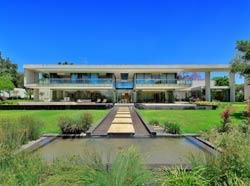
Priced at R52.5 million, this four bedroom Stefani Antoni designer home in Sandhurst makes a bold statement with cubistic influences and perspective all highlighted by strategic lighting. Click here to view.
According to WealthInsight, HNWIs in South Africa have registered strong growth since the global economic crisis and the country has the highest number of HNWIs in Africa.
As of 2011, there were over 44 700 HNWIs in South Africa, with a combined wealth of US$188 billion, accounting for roughly 27 percent of South Africa’s total individual wealth (US$740 billion).
The total number of HNWIs in South Africa increased by 17.9 percent during the review period of 2007 to 2011, while HNWI wealth rose by 15.2 percent, according to the firm.
WealthInsight points out that these individuals' wealth was positively influenced by a strong local property market, high savings rates and a significant appreciation of the South African rand against the US dollar over the review period.
Click here to read the report.
According to Andrew Amoils, WealthInsight senior analyst and head of reports team, over the period 2011 to 2016, South Africa’s HNWI wealth is set to grow by 51 percent to reach US$285 billion in 2016.
HNWI volumes will see a smaller percentage increase, growing by 41 percent to reach just over 63 200 individuals in 2016.
Wealthy suburbs to buy into
Johannesburg is home to 261 ultra high net worth individuals (UHNWIs) with wealth of US$30 million or more, including equities, bonds, cash and deposits, fixed-income products, real estate, alternative assets and business interests.
Of more interest, the majority of these own homes in the top three suburbs with Sandhurst (36) taking the lead followed by Bryanston (31), Hyde Park (26), Westcliff (20), Houghton (15), Parktown (15), Dainfern (10), Atholl (5) and other (103).
According to Jonathan Davies, Pam Golding Properties joint area manager for the Hyde Park office, these wealthy suburbs are sought after and are in their own league for a number of reasons.
Firstly, homeowners are mostly affluent individuals who own high value homes and these homes tend to sell at much higher prices compared to other suburbs.
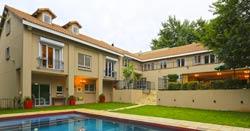
This five bedroom and five bathroom home in Bryanston has a wine cellar and double staff accommodation. It is selling for R19.7 million. Click here to view.
He notes that they are currently marketing luxury homes in Sandhurst with a price tag of R52.5 million, a R19.7 million home in Bryanston, a R7.9 million property in Westcliff and another R8 million luxury pad in Hyde Park.
Secondly, he says many of these homes are not heavily bonded and are generally not as susceptible to interest rate fluctuations.
“Homeowners tend to be financially secure and generally do not feel recessionary pressures as much as others do.
“This makes these markets highly distinctive with their own individual ebbs and flows,” says Davies.
Bryanston not only boasts highly prized homes - even the commercial property continues to attract investors and buyers alike with sought-after new office developments and other developments such as the luxury R500m Nicolway Bryanston Mall which opened in April 2012.
The suburb also boosts some of the luxury car properties and green homes costing a premium.
According to Windeed, in 2012, the average selling price for a freehold home was R3.3 million and a total of 325 freehold homes were sold that year.
The average selling price for sectional title homes was R1.13 million and 177 units were sold in 2012.
Davies says if one looks at an average suburb the following happens during times of recession:
1. The owner is normally heavily bonded and an increase in interest rates or a reduction in discretionary income puts him/her under financial pressure
2. If owners are unable to weather the pressure they may be placed in the unfortunate situation of having to sell
3. Owners are forced to look at realistic prices in order to sell in a specific, reduced time frame.
This has the net effect of reducing or softening the prices in a particular market.
But higher value suburbs are generally home to financially secure owners, so when there is a downturn in the market they are better able to weather the storm.
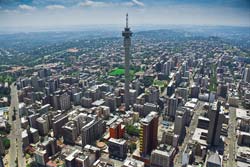
Billionaires who own homes in Johannesburg include Patrice Motsepe (US$2.7 billion) - the only black billionaire in the country and he is the chairman of ARM Gold (previously African Rainbow Minerals) and Christo Wiese (US$2.650 billion) is the chairman and founder of retail giant Shoprite.
In certain cases owners of high value properties have been known to simply lock up their South African homes to move abroad.
They can afford to wait out the storm and sell once the market has recovered thus enabling the owner to hold the market to ‘ransom’, sticking to their price until they can eventually find a buyer, he explains.
"Would-be buyers wishing to purchase in these suburbs can usually expect to pay a premium and this also explains why the lower priced suburbs are seeing a constant ‘churn’ of sales whereas the higher priced areas have slowed.”
Asked about the average selling prices in each of these wealthy suburbs, he says they vary making it difficult to say this is what an average home will sell for in Sandhurst or Westcliff for example.
However, the design, quality, size, fittings, exact location of a home in most cases determine the selling price.
Location within a wealthy location does take new meaning especially when it comes to pricing.
As Seeff Properties noted last year, wealthy buyers are more concerned about home locations and designs.
In Johannesburg, for example, Coronation Road in Sandhurst is sought-after for its homes as is Nettleton Road in Clifton, Cape Town.
Read the article here.
While all of these suburbs are considered excellent addresses they all have their individual nuances, points out Davies.
Westcliff has the appeal of older properties, some of which are heritage homes and buyers seek out these homes, and as they are hard to come by with spectacular views hence they are often prepared to pay higher prices for them.
“Bryanston also offers phenomenal views and roads including Mount Street, Eccleston and Culross which offer panoramic views over Johannesburg.
“It is also a centrally situated suburb with relatively easy access the N1 Western Bypass highway and Sandton,” he says.
Hyde Park has always been an enviable address and some of South Africa’s most expensive homes can be found in this suburb.
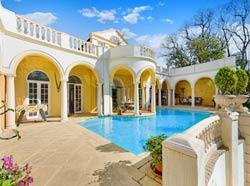
Located in the suburb of Westcliff, this home is selling for R7.9 million. Click here to view.
Centrally situated close to Sandton it has number of large upmarket homes in which considerable investments have been made.
Davies says Houghton is also one of Johannesburg’s older tree-lined suburbs offering wonderful views, a geographically desirable location and many beautiful heritage homes.
“People buy into these locations as they may appreciate the fact that a property is close to a place of worship and excellent schools.”
This offers convenience, which is an important factor while others look for outstanding security or simply a good address that will hold its value well over time.
Property prices
Asked about drivers of the market in these suburbs, he says price is usually a key factor that people consider when purchasing a home.
Buyers of wealthy homes with unparalleled views or a history are not worried about the price tag, the emphasis for them is the value they get from that particular property.
Davies says in other words, although price has an impact it is softened by the buyers’ need.
“Some buyers specifically wish to be in close proximity to their religious places of worship, which can again create demand in certain suburbs that offer this benefit.”
According to a Windeed report, a property measuring 5 784 square metres located on Harrow Road in Sandhurst was sold for R45 million and some properties have sold for just over R1.5 million in the suburb.
The report reveals that in 2012, the average selling price of a freehold home in Sandhurst was R11.5 million (14 homes sold) and sectional title homes were averaging (R1.750 million) with 51 units sold.
Interesting though is that the average selling price of a freehold home has come down back to the 2007 price (R11.5 million) from a high of R16 860 million in 2008.
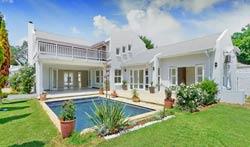
Recently renovated, this Hyde Park home with a separate spacious guest cottage is on the market for R8 million. Click here to view.
In 2008, however, sectional title homes were averaging R1.495 million and so there has been a price growth although in 2011, the average was high at R1.8 million.
These suburbs also have a highly positive sentiment attached to them and buyers are more confident when buying in these suburbs specifically because they are expected to offer better prospects for growth than less established, affluent suburbs, he says.
Johannesburg’s rich list
According to the WealthInsight report, as at the end of 2011, there were four billionaires in South Africa compared with five in 2007.
It is expected that in 2016, the number of billionaires is forecast to increase by 75 percent to seven individuals.
The Oppenheimer family has been the richest family in South Africa for three generations, starting with Ernest Oppenheimer, who gained control of Cecil John Rhodes’ De Beers diamond empire in 1927.
Ernest later founded Anglo American, now the largest mining company in the country.
He was succeeded by his son Harry Oppenheimer, who in turn passed the reins on to Nicolas Oppenheimer who currently resides in Luxembourg.
Their wealth as of 2011 is US$6.8 billion.
Johann Rupert (US$5.1 billion) is the chairman of luxury retail group Richemont, which he took over from his father Anton Rupert more than a decade ago.
Rupert currently resides in Geneva.
The last two billionaires own homes in Johannesburg with Patrice Motsepe (US$2.7 billion) - is the only black billionaire in the country and he is the chairman of ARM Gold (previously African Rainbow Minerals).
At number four is Christo Wiese (US$2.650 billion) is the chairman and founder of retail giant Shoprite.
Ivan Glasenberg (worth US$8.9 billion) of Glencore and Elon Musk (worth US$1.7 billion) of PayPal were excluded from the list as they earned most of their wealth abroad and have been based outside the country for many years, says Amoils.
He says centimillionaires (HNWIs with wealth of between US$100 million and less than US$1 billion) as of 2011 held US$35 billion in total assets – representing 18.5 percent of total HNWI wealth.
During the period 2007 to 2011, their wealth rose by 17.4 percent and this is expected to rise by 54 percent to US$54 billion by 2016.
Johannesburg has plenty of centimillionaires and some have wealth tied to real estate including Donald Gordon, Nathan Kirsh, Sol Kerzner (hotel and leisure), Eric Ellerine (retail and fashion) and Danie Ferreira.
The city boosts the highest number of centimillionaires, 18 out of 24 with some having made their wealth through diversified investments (Cyril Ramaphosa and Brian Joffe) as well as finance (Stephen Koseff and Paul Harris) among other investments.
Cape Town has two (Ackerman family, retail & fashion and Neil & Cecil Jowell, diversified) and Stellenbosch (Michiel le Roux, finance) one centimillionaire while Durban has one (Stephen Saad, healthcare). – Denise Mhlanga









